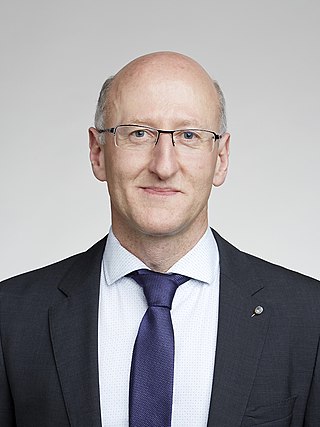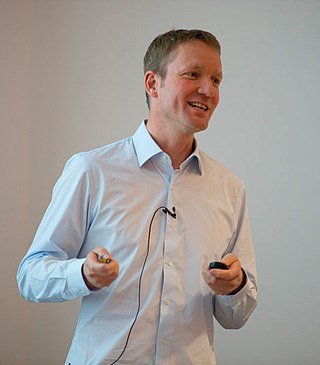
Richard Henderson is a British molecular biologist and biophysicist and pioneer in the field of electron microscopy of biological molecules. Henderson shared the Nobel Prize in Chemistry in 2017 with Jacques Dubochet and Joachim Frank. "Thanks to his work, we can look at individual atoms of living nature, thanks to cryo-electron microscopes we can see details without destroying samples, and for this he won the Nobel Prize in Chemistry."
John Graham White is an Emeritus Professor of Anatomy and Molecular Biology at the University of Wisconsin–Madison. His research interests are in the biology of the model organism Caenorhabditis elegans and laser microscopy.
Dame Jean Olwen Thomas, is a Welsh biochemist, former Master of St Catharine's College, Cambridge, and Chancellor of Swansea University.
David Moore Glover is a British geneticist and Research Professor of Biology and Biological Engineering at the California Institute of Technology. He served as Balfour Professor of Genetics at the University of Cambridge, a Wellcome Trust investigator in the Department of Genetics at the University of Cambridge, and Fellow of Fitzwilliam College, Cambridge. He serves as the first editor-in-chief of the open-access journal Open Biology published by the Royal Society.
Brigid L. M. Hogan FRS is a British developmental biologist noted for her contributions to mammalian development, stem cell research and transgenic technology and techniques. She is currently a Professor in the Department of Cell Biology at Duke University, Born in the UK, she became an American citizen in 2000.
William Bradshaw Amos is a British biologist, Emeritus Scientist at the Medical Research Council (MRC) Laboratory of Molecular Biology (LMB). He led a team that developed the mesolens, a microscope with a giant lens.

Ronald Alfred LaskeyFLSW is a British cell biologist and cancer researcher.
Sir Hugh Reginald Brentnall Pelham, is a cell biologist who has contributed to our understanding of the body's response to rises in temperature through the synthesis of heat shock proteins. He served as director of the Medical Research Council (MRC) Laboratory of Molecular Biology (LMB) between 2006 and 2018.

Ramanujan Shankar Hegde is a group leader at the Medical Research Council (MRC) Laboratory of Molecular Biology (LMB).

Jonathon Noë Joseph Pines is Head of the Cancer Biology Division at the Institute of Cancer Research in London. He was formerly a senior group leader at the Gurdon Institute at the University of Cambridge.

Richard Paul Harvey is a molecular biologist, the Sir Peter Finley professor of Heart Research at the University of New South Wales and Deputy Director and Head of the Developmental and Stem Cell Biology Division at the Victor Chang Cardiac Research Institute.
James Briscoe is a British scientist who is a senior group leader at the Francis Crick Institute in London and editor-in-chief of the journal Development.

Andrew Neil James McKenzie is a British molecular biologist who is a group leader in the Medical Research Council (MRC) Laboratory of Molecular Biology (LMB).

Jan Löwe is a German molecular and structural biologist and the Director of the Medical Research Council (MRC) Laboratory of Molecular Biology (LMB) in Cambridge, UK. He became Director of the MRC-LMB in April 2018, succeeding Sir Hugh Pelham. Löwe is known for his contributions to the current understanding of bacterial cytoskeletons.

Sir Richard Henry Treisman is a British scientist specialising in the molecular biology of cancer. Treisman is a director of research at the Francis Crick Institute in London.

Neil Alexander Steven Brockdorff is a British biochemist who is a Wellcome Trust Principal Research Fellow and professor in the department of biochemistry at the University of Oxford. Brockdorff's research investigates gene and genome regulation in mammalian development. His interests are in the molecular basis of X-inactivation, the process that evolved in mammals to equalise X chromosome gene expression levels in XX females relative to XY males.

Richard A. Dixon is a British biologist who is distinguished research professor at the University of North Texas, a faculty fellow of the Hagler Institute of Advanced Study and Timothy C. Hall-Heep distinguished faculty chair at Texas A&M University.

Sean Munro is a Group Leader at the Medical Research Council (MRC) Laboratory of Molecular Biology (LMB). From 2012 until 2023, he served as Head of the Cell Biology Division.
Thomas Martin Embley is a British scientist who is a professor at Newcastle University who has made contributions to the understanding of the origin of eukaryotes and the evolution of organelles such as mitochondria, mitosomes and hydrogenosomes, that are found in parasitic protists.

M. Madan Babu is an Indian-American computational biologist and bioinformatician. He is the endowed chair in biological data science and director of the center of excellence for data-driven discovery at St. Jude Children's Research Hospital. Previously, he served as a programme leader at the MRC Laboratory of Molecular Biology (LMB).












